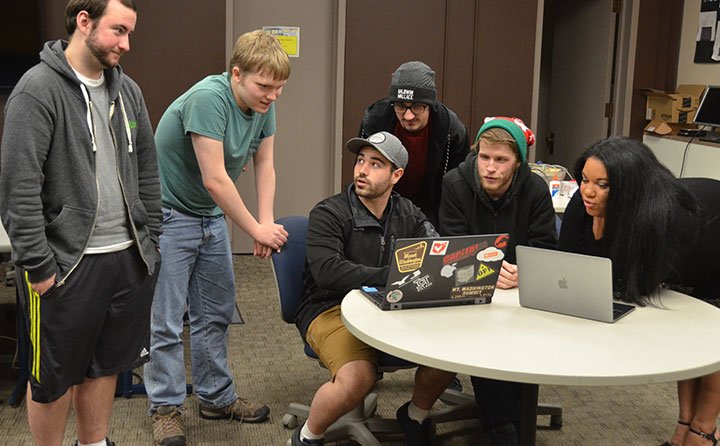Cyber Defense Team wins national competition
BW students top 173 teams in two-day cyber-security eventv
This past November, the Baldwin Wallace Cyber Defense Team outscored 173 other teams to take the top spot on the leaderboard for the National Cyber League (NCL) Fall 2017 Postseason team competition.
“The Cyber Defense team is not an official club. It’s a loose group of students who are interested in computer security, or better known as cyber defense,” said Kenneth Atchinson, PE, Associate Professor of Computer Science and faculty advisor for the team. “They all have an interest in tinkering around in cyber security and want to participate in some kind of challenging event.”
The Fall 2017 team, going by the name of “Ken’s Little Pwnies,” was composed of Kasper, co-captain Jonathan Cartwright ’16, Ian Walton ’20, John Blainer ’18, Dan Jesensky ’18, Andrew Wilhelm ’18, Kurt Wolfe ’18, and Emory Leinweber ’21. Walton also scored third place nationally in the regular season individual portion of the NCL competition.
According to the NCL competition’s website, the individual and team event challenges feature elements of both offensive and defensive cybersecurity and test competing teams in the areas of “Open Source Intelligence, Scanning, Enumeration and Exploitation, Password Cracking, Traffic Analysis, Log Analysis, Wireless Security, Cryptography, and Web Application Security.”
“It’s kind of like capture the flag, but with a lot of traps,” said team captain and computer network security major, Meredith Kasper ’20.
“The second part [of the NCL event] is the team [competition],” said Atchinson. “What happens is that people who participated in the individual can form a team, and then the team works on puzzles as a team to gain points and is ranked nationally.”
The NCL individual and team competitions are formatted similarly, said Atchinson, with either single competitors or teams being given a puzzle book full of cyber security challenges. Team members had to compete as many puzzles as possible during the duration of this event in order to earn points and move up the leaderboard.
During the event, student teams compete remotely and may work from any location they choose over the days of the competition, said Kasper, usually the computer science lounge or a BW classroom.
“For the team competition, we all get in a room for as long as we can stand each other and try to team-think all of these puzzles that they give us,” said Kasper. “For the team competition this year, there were, I think, 96 different puzzles all with different levels of difficulty, of course. Some take two or three seconds to solve. Some people spend hours or a day and a half on one puzzle. The competition is two days long, so it’s really imperative that we start as soon as they release those challenges.”
Students also collaborate over group chatting applications such as Discord, said Atchinson. This allows the team to work together at all hours for the duration of the competition.
“I logged into [Discord] early Sunday, and they were chatting at 4 AM,” said Atchinson. “And I’m going like, ‘Guys, do you guys sleep?’ …They work long hours.”
Besides the team’s willingness to sacrifice sleep, Kasper said, another of its strengths was the variety and versatility in its members’ areas of specialty.
“With our team this past year in the fall, we had at least one person for each specialty of the different categories of challenges, and then we had a lot of people who were able to float between,” said Kasper. “That was really great to see, that we actually had a team that was so versatile.”
The group’s versatility, perseverance, and teamwork proved critical to Ken’s Little Pwnies taking the lead from the previous year’s winning team within the final hour of the event, said Kasper.
“Within the last hour of the competition, we had gotten down to having only four unsolved challenges left,” said Kasper. “One of those four unsolved challenges was one of those that really required a team effort, because we all have so many different specialties.”
Besides NCL, the BW Cyber Defense Team also regularly competes in the annual Collegiate Cyber Defense Competition (CCDC). This year, said Atchinson, the team also plans on participating for its first time in the Department of Energy Cyber Defense Competition in Chicago.
The Exponent is looking for financial contributions to support our staff and our newsroom in producing high-quality, well-reported and accurate journalism. Thank you for taking the time to consider supporting our student journalists.











































